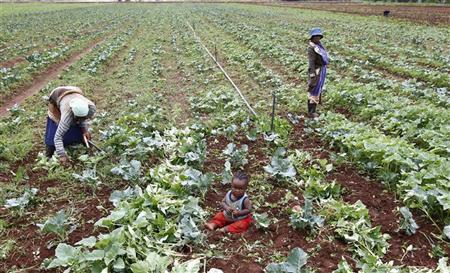By Olivia Kumwenda and Jon Herskovitz
SENEKAL, South
Africa (Reuters) – South Africa’s plans to undo the wrongs of apartheid by returning land seized from native blacks is
embodied in the life of Koos Mthimkhulu.

in South Africa, February 15, 2010. REUTERS/Siphiwe Sibeko
He was born on
a white-owned farm in 1955 and attended a school set up by white farmers to give him just enough education for a life as
field hand. A short childhood gave way to decades of milking cows, driving tractors and ploughing fields for poverty-level
wages.
When white-minority rule ended in 1994, the new democratic government made it a priority to return land to
those dispossessed. It wrote the idea into the constitution and made a plan that would make people like Mthimkhulu
independent farmers.
Yet the practice under the African National Congress (ANC) has fallen far short of targets and
disappointment is stocking up new risks of social, racial and economic crisis to threaten the very democracy intended to save
South Africa from disaster.
The post-apartheid government selected Koos Mthimkhulu for a programme under which it
would buy agricultural land from white farmers and turn parcels over to blacks who had claims on the territory. It offered
him money, advice and moral support.
Greying at the temples and at ease tending a herd of cattle and tilling fields,
he now grows maize and sunflowers in the central flatlands of the Free State, no longer tethered to white bosses and proud of
his substantial 500-hectare (1,200-acre) holding, of which about a quarter is suitable for crops
But Mthimkhulu does
not own the land, the government does. And in all likelihood, without ownership, he seems destined for the failure that has
hit many like him who thought themselves among a fortunate few to get land: “I struggled for a long time and I can’t get a
loan from banks because I can’t use the farm for security,” he said in the local Sesotho language.
That is not the
only drawback small farmers like Mthimkhulu face; South Africa’s land reform ideals are being crushed by government
mismanagement and the economics of pitching the new, small-scale operations into competition with the industrial-size farms
that have made the country a global agricultural powerhouse, exporting billions of dollars in farm products.
Most food
is grown at places like the Royal Dawn orange farm, 300 km (200 miles) northeast of Mthimkhulu’s homestead, in Mpumalanga
province.
There, hundreds of hectares of carefully maintained citrus groves are crisscrossed by a network of pipes for
automated irrigation. Each row of trees is alphabetised and bar-coded, enabling the farm manager, a white man like the
owners, to keep a computerised track of fertilizer needs and use.
The system allows supermarkets in export markets as
far away as Beijing to trace an individual box of oranges back to the row form which they were picked – by a black
labourer.
Other African states are even recruiting South Africa’s big commercial farmers, most of whom are white, to
grow in their countries, hoping their expertise will increase their overall revenue from farming. Small local outfits can
barely compete.
RACIAL INJUSTICE
The origins of the problem the ANC has tried to resolve lie deep. A century
ago, under British rule, South Africa’s 1913 Natives’ Land Act set aside 87 percent of all land for the small white
minority and 13 percent for black Africans.
Two decades of land reform under the ANC, which this year seems set to
retain President Jacob Zuma as the leader who will continue its one-party dominance at elections in 2014 , have done little
to change those land ownership ratios set 100 years ago.
Plans drawn up under the first black president, Nelson
Mandela, were meant by 2014 to hand over to blacks 30 percent of commercial farmland – a type of land that had been almost
exclusively owned by whites, who form less than a tenth of the population. The government says so far it has achieved only 8
percent, but still says wants to reach 30 percent in two years.
One reason for that has been its reluctance to act by
force. Its “willing buyer, willing seller” programme means the pace is set by white farmers agreeing to trade. Striking deals
at market rates is often elusive, raising allegations of corruption in the setting of prices, and in the disposal of state
funds.
And even when farms are returned to black residents, many are doomed to fail. Then real estate developers or
factory farming businesses, mostly owned by whites, may step in and buy the land back – reversing progress toward the land
target.
“Restitution needed to be done. But something went terribly wrong with the implementation,” said Theo de
Jager, vice president of AgriSA, a body which represents the agriculture industry and principally large white-owned
businesses.
Echoing officials at the Department of Land Reform, who say most reallocated farmland is “unproductive”,
de Jager said: “I visited more than 200 farms that have been transferred over the last two and half years and I haven’t been
on one that is a commercial success. None of those farmers are making a profit.
“And if it is not profitable, it’s
not sustainable.”
A TIME BOMB
Land is at the heart of racial injustice in South Africa and has the potential to
dent a democracy where about 40 percent of the population of 50 million lives in rural areas. The crisis is not now, but
without action now it will grow as a threat.
“The land issue is a symbol for blacks of everything that has been lost
to whites,” said James L. Gibson, a professor of government at Washington University in St. Louis, Missouri, who has studied
the issue intensively in South Africa.
Gibson sees land reform as a time bomb, given the large number of the black
majority who feel they have been victimised and the glacial pace at which land is being returned.
One of his surveys
indicates that an overwhelming majority of blacks feel land was unfairly taken by the colonisers and current white holders
have no right to the land today.
“The ANC is fearful on many fronts that a demagogue is going to come along and
present a serious challenge to the establishment. I don’t think that it will spontaneously erupt. It has to be sparked by a
leader,” he said.
The ANC this year expelled the most prominent voice calling for an expropriation of white-owned
farms, its youth leader Julius Malema. His demands had raised the prospect of a seizure of white-owned farmland, like that in
neighbouring Zimbabwe, which many argue ruined a thriving agricultural economy.
But even with Malema being sent to the
political wilderness, there are other prominent voices calling for a seizure of white-owned land, including Irvin Jim, the
general secretary of the powerful metalworkers trade union NUMSA.
Weighing in the minds of ANC policy makers is what
happened when Zimbabwean President Robert Mugabe started seizing white-owned farms a decade ago. Land has gone fallow and the
breadbasket of Africa has been pushed to the brink of famine.
One of the ANC’s policy priorities for this year is
completing its latest policy paper on land reform. A draft released last year said the goal “is to ensure that all land
reform farms are 100 percent productive”, and to meet the 30 percent redistribution target by 2014.
Lechesa Tsenoli,
land reform deputy minister, said complex claims to ancestral property slowed the process. Often, he said, relatives
disagreed over which of the three types of available settlement they wanted – namely getting the land that belonged to their
forebears, getting alternative land or cash.
“It will impossible until we start doing things that we think we will
solve it,” he said.
“The issue is potentially explosive.”
A TOUGH BUSINESS
Seeking to make good on
commitments to make reallocated farms a success, South Africa offers one of the strongest farmers advisory agencies on the
continent.
With hundred of offices in every province, the Agricultural Research Council helps match crops to local
soil, gives advice on irrigation and helps diversify the gene pools of livestock.
But coordination among government
agencies can be poor, adding the troubles of those pitched into running new farms. The Department of Land Reform is separate
from the Agriculture Ministry. Other local bodies, seed suppliers and specialised financiers are often not coordinated. And
the ARC may not be notified of small farmers needing help until it is too late.
“If you are not in the market with the
right product at the right time, you are not really going to make it,” said Shadrack Moephuli, ARC’s president and chief
executive. “If all the role players are not there for you at the right time, and sequenced appropriately, you are likely to
lose out.”
If beneficiaries can make their way through financing, seed purchases, planting, growing and mechanised
harvesting, they often fail in finding a place to sell their product.
The window shuts quickly for success or failure
with one poor harvest enough to bankrupt a new farmer.
Some want the government to set up cooperatives to help the
beneficiaries of its land reform programme get better prices on seeds and fertilizers and share costs of agricultural
machinery.
Moephuli of the ARC says the government should keep costs down, too, when it buys land to redistribute and
not rush to give it away to people ill-equipped to work it profitably: “Farming is not an emotional thing,” he
said.
“It is a business, and a very complex business.”
Koos Mthimkhulu has learned that lesson all to
well.
Strolling through his acres of maize, on the plain where he also grazes cattle close to the farmhouse he took
over when the white owners moved on, he fears the government grants that got him started may soon dry up.
Without
profits to plough back in, he then may no longer be able to afford seed – unless he goes back to labouring for a wage on
other farms in the area still owned by wealthier whites.
“It’s hard to make it as a farmer without the right
support,” he said. “Without the right help, we will fail.”





